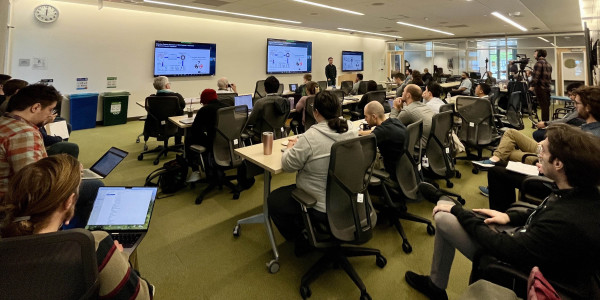As part of this tradition, on Tuesday, Feb. 6 the CSA held its fifth annual Postdoc Symposium at Berkeley Lab, where postdoctoral researchers currently working at the Lab shared 10-minute slide presentations on their exciting projects with an audience of peers, mentors, and coworkers. In addition, in the weeks leading up to the event, CSA staff provided communications training and coaching to help them fine-tune their presentations and messaging.
This event was first held in 2020 and has become “a great tradition we’ve continued every year since,” said Jonathan Carter, Associate Lab Director for Computing Sciences, in his welcoming remarks. The number of participants is growing as well, he noted; from 2020-2023, there were a total of 75 speakers, while this year there were 26 speakers, with some returning from 2023.
“This is one of my favorite CSA events,” said Stefan Wild, Director of the Applied Mathematics & Computational Research (AMCR) Division. “It is awesome to see how much energy our senior staff put into the training events leading up the symposium and to watch the great progress that each presenter makes over the course of the program.”
“It was great to see the work of CSA postdocs at the symposium,” added Ana Kupresanin, Director of the Scientific Data (SciData) Division. “The event reminded us of the value of sharing ideas and supporting each other.”
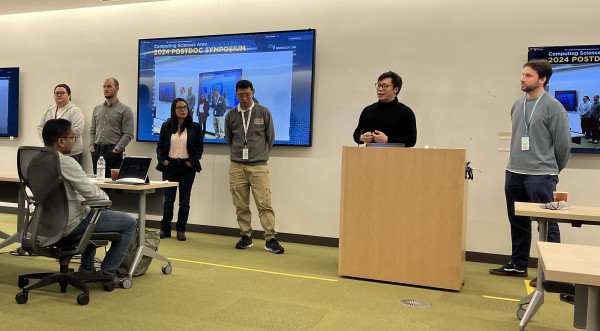
Several participants emphasized the positive impact the event and the weeks of coaching and preparation for it has had on their professional development.
“This was my first time participating in the Postdoc Symposium, and I am glad I signed up since it was a great experience!” said Luka Grbcic, who is in AMCR’s Applied Computing for Scientific Discovery Group. “The coaching sessions, run-throughs, and constructive feedback were incredibly valuable. These resources served not just as preparation for the symposium but also fundamentally enhanced my approach to presentations. My ability to articulate my work in a more accessible and universally understandable manner has significantly improved.”
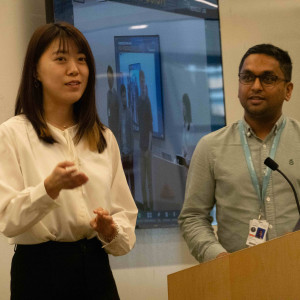
“[The coaching sessions] were what made this experience stand out among the many avenues we have for presenting our work,” added Mukul Dave, who is in the Application Performance Group at the National Energy Research Scientific Computing Center at Berkeley Lab. “We received feedback from senior scientists across different research areas and from communications professionals, benefitting from their years of experience.”
“This is a great opportunity for postdocs to examine their work, collect feedback, and disseminate research!” said Wei Zhang of SciData’’s Scientific Data Management Group.
Pu Ren of SciData’s Machine Learning and Analytics Group agreed. “I received two rounds of feedback for the slides and during the dry run, and that helped me improve my presentation a lot. I am really grateful for the feedback from the reviewers.”
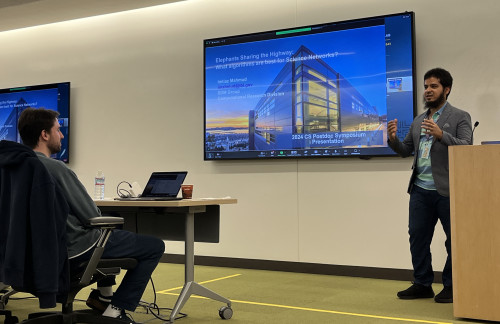
Alec Dektor joined AMCR’s Scalable Solvers Group about seven months ago and was very excited when he learned about this professional development opportunity. “It was an excellent chance to share some of my work and learn valuable presentation skills that will benefit the rest of my career.”
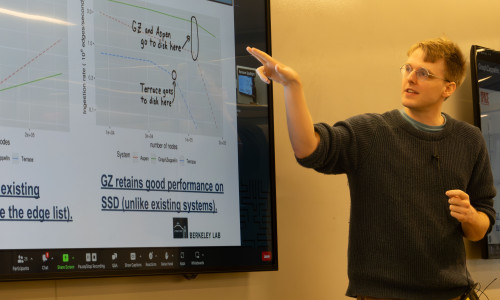
For those who didn’t attend the symposium this year, Jonghyun Bae of AMCR’s Performance and Algorithms Research Group recommends participating in the future. “This symposium gave me opportunities to greet other researchers who I did not have the chance to meet before. Also, I was able to talk to some researchers and postdocs who are interested in my research, which I think is very positive for the formation of the next research and communication network.”
Dong Min Roh of AMCR’s Scalable Solvers Group agreed. “Not only do you learn the skills of giving a short talk to a general audience, you get to learn about other exciting research projects that are going on at the lab and speak to other postdocs who you may not usually run into.”
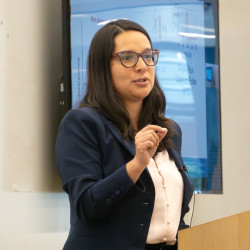
“To other young researchers, I would recommend participating in this symposium as early as possible in your postdoc journey,” said Patricia Gonzalez-Guerrero of AMCR’s Computer Architecture Group – who, on the same day she gave her presentation, was coincidentally offered a research scientist position at Berkeley Lab.
All of the presentations were recorded and will be available soon on the CSA YouTube channel.
About Computing Sciences at Berkeley Lab
High performance computing plays a critical role in scientific discovery. Researchers increasingly rely on advances in computer science, mathematics, computational science, data science, and large-scale computing and networking to increase our understanding of ourselves, our planet, and our universe. Berkeley Lab's Computing Sciences Area researches, develops, and deploys new foundations, tools, and technologies to meet these needs and to advance research across a broad range of scientific disciplines.

